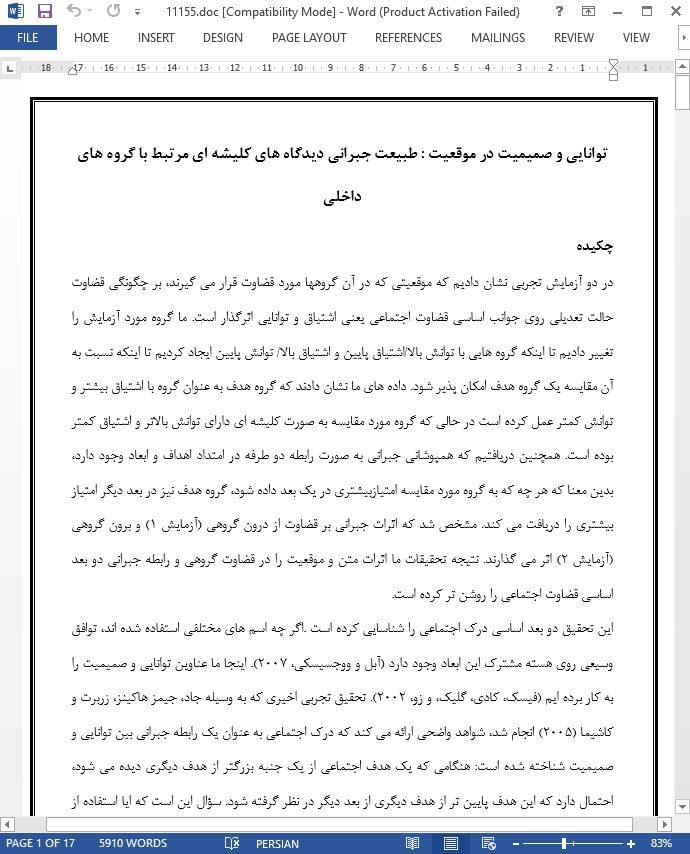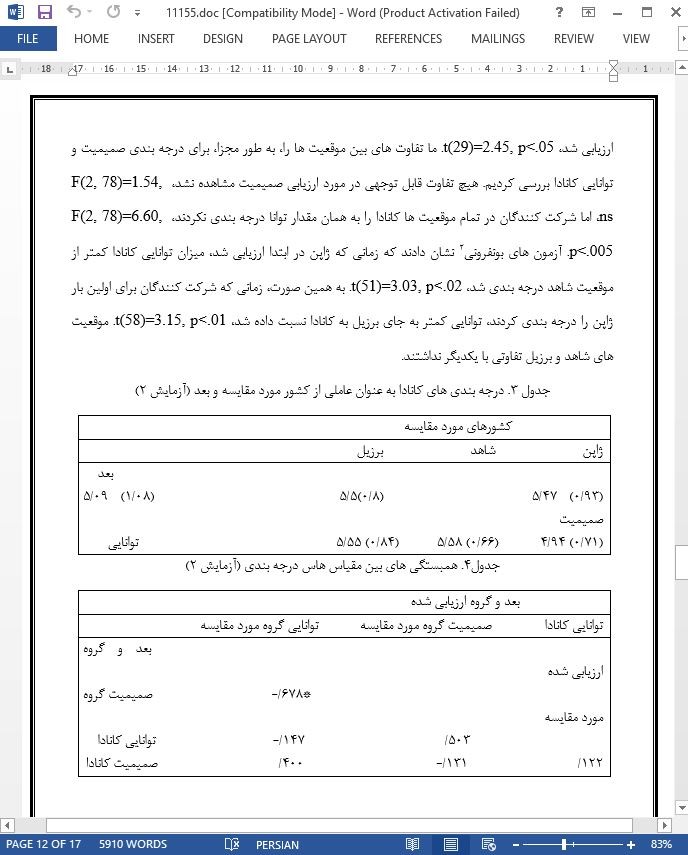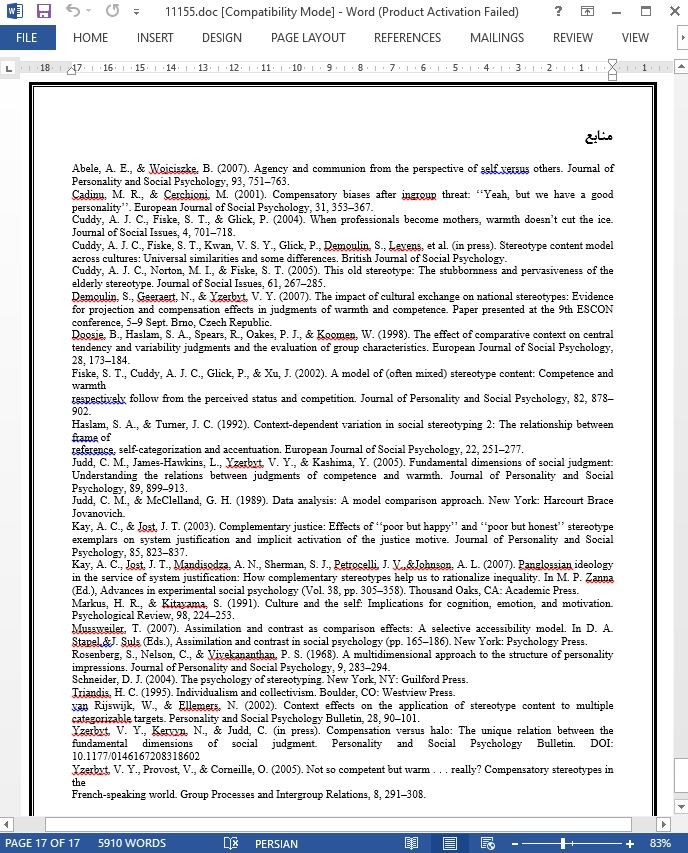
توانایی و صمیمیت در موقعيت : طبیعت جبرانی ديدگاه های كليشه ای مرتبط با گروه های داخلی
چكيده
در دو آزمايش تجربي نشان داديم كه موقعيتي كه در آن گروهها مورد قضاوت قرار می گیرند، بر چگونگي قضاوت حالت تعديلي روي جوانب اساسي قضاوت اجتماعي يعني اشتياق و توانايي اثرگذار است. ما گروه مورد آزمايش را تغییر دادیم تا اينكه گروه هايي با توانش بالا/اشتياق پايين و اشتياق بالا/ توانش پايين ايجاد كرديم تا اينكه نسبت به آن مقایسه يك گروه هدف امكان پذير شود. داده هاي ما نشان دادند كه گروه هدف به عنوان گروه با اشتياق بيشتر و توانش كمتر عمل كرده است در حالی كه گروه مورد مقایسه به صورت كليشه اي داراي توانش بالاتر و اشتياق كمتر بوده است. همچنين دريافتيم كه همپوشاني جبراني به صورت رابطه دو طرفه در امتداد اهداف و ابعاد وجود دارد، بدين معنا كه هر چه كه به گروه مورد مقایسه امتیازبیشتری در یک بعد داده شود، گروه هدف نیز در بعد دیگر امتیاز بیشتری را دریافت می کند. مشخص شد که اثرات جبراني بر قضاوت از درون گروهی (آزمايش 1) و برون گروهی (آزمايش 2) اثر می گذارند. نتيجه تحقيقات ما اثرات متن و موقعيت را در قضاوت گروهي و رابطه جبراني دو بعد اساسي قضاوت اجتماعي را روشن تر كرده است.
محدودیت ها و تحقیقات بیشتر
گروه های مورد مقایسه ای که در دو آزمایش مورد استفاده قرار دادیم، موضوع کلیشه های مرکب بودند. ما این گزینه ها را به عنوان اولین قدم برای نشان دادن اثراتی در نظر می گیریم که فرض کرده بودیم. در تحقیقات آتی تلاش برای جدا کردن دو بعد در گروه های مورد مقایسه ای که تنها در یک بعد با هم فرق دارند، می تواند جالب باشد.
همانند تفسیر توجیه سیستم، مایلیم تا بفهمیم آیا این فرایند جبرانی هیدورلیک تلاشی آگاهانه برای جستجوی عدالت در دنیا است یا خیر. اگر چنین باشد، گمان می کنیم که تفاوت های فردی وجود دارد که احتمالاً بر تمایل برای جبران اثر می گذارند. مسئله مرتبط دیگر به این موضوع می پردازد که آیا الگوی جبرانی که، در مقایسه های میان گروهی آشکار کردیم، اثر داوری غیرارادی و خود به خودی نسبی هستند که لزوماً از بینش آگاهانه ناشی نشده اند؟ ممکن است به نظر برسد که اگر فرایند جبران نمایانگر تلاشی برای جستجوی عدالت در جهان، مطابق با دیدگاهی از توجیه سیستم، باشد، آنگاه این فرایندی غیرارادی و غیرآگاهانه نخواهد بود. اما ما در این مورد قانع نشده ایم و در حال حاضر در مورد این مسئله و سئوالات مرتبط با آن تحقیق می کنیم.
Abstract
In two experiments we show that the context in which groups are perceived influences how they are judged in a compensatory manner on the fundamental dimensions of social judgment, that is, warmth and competence. We manipulate the type of country (high in competence and low in warmth vs. high in warmth and low in competence) to which a target country is compared. Our data show that the target country is perceived as warmer and less competent when the comparison country is stereotypically high (vs. low) in competence and low (vs. high) in warmth. We also found compensation correlationally across targets and across dimensions in that the higher the comparison country is rated on one of the two dimensions, the higher the target country is rated on the other. Compensation effects are shown to affect judgments of both the ingroup (Experiment 1) and an outgroup (Experiment 2). Our results shed new light on context effects in group judgments as well as on the compensatory relation of the two fundamental dimensions of social judgment.
Limitations and Future Research
The comparison groups that we have used in both experiments were the object of mixed stereotypes. We consider these choices as a necessary first step to show the effects that we hypothesized. It would be interesting in future work to try and disentangle both dimensions by working with comparison groups that vary only on one dimension but are similar on the other.
As for the system justification interpretation, we would like to test whether this hydraulic compensatory process is a deliberate attempt to seek justice in the world. If so, we would speculate that there exist individual differences that are likely to affect the tendency to produce compensation. A second, related, issue concerns whether the compensatory pattern that we have uncovered in intergroup comparisons is a relative automatic and spontaneous judgmental effect, not necessarily resulting from conscious deliberation. It might seem that if the compensation process represents an attempt to seek justice in the world, consistent with a system justification point of view, then it would not be an automatic and non-conscious process. But we are not convinced that this is the case and are currently researching this and related questions.
چكيده
جبران در قضاوت هاي اجتماعي
ارزيابي جبران
اثر موقعيت بر محتوای كليشه اي
شرح مختصر مطالعات رایج
آزمایش 1
شیوه
نتایج
بحث
آزمایش 2
روش
نتایج
بحث کلی
محدودیت ها و تحقیقات بیشتر
Abstract
Compensation in Social Judgments
Assessing Compensation
The Impact of Contexts on Stereotype Content
Overview of the Current Studies
EXPERIMENT 1
Method
Results
Discussion
EXPERIMENT 2
Method
Results
GENERAL DISCUSSION
Limitations and Future Research
- اصل مقاله انگلیسی با فرمت ورد (word) با قابلیت ویرایش
- ترجمه فارسی مقاله با فرمت ورد (word) با قابلیت ویرایش، بدون آرم سایت ای ترجمه
- ترجمه فارسی مقاله با فرمت pdf، بدون آرم سایت ای ترجمه



